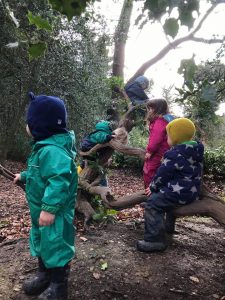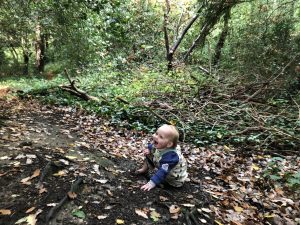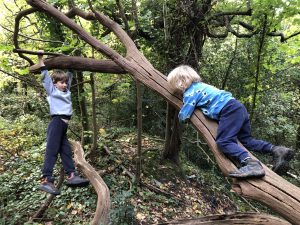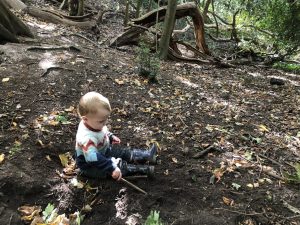All about Free We Grow Nature Play!
The Free We Grow Nature Play sessions are about letting babies and children ‘go’ in nature – creating time and space for them to follow their own in-built urges to play, explore, move and connect. It is a place for their grown-ups to practice how to take a step back and observe, to be present with their children without needing to be involved in their play. For children and grown-ups alike, it is time to enjoy being in nature.

Sessions are free to attend and held weekly in Sydenham Hill woods, come rain or shine, so we can experience all the weathers in all the seasons.
Nature Play® was founded by Clare Caro in 2011, and grew into multiple groups across London, as well as one in Singapore! From the start of 2023, the running of the Southeast London Nature Play group passed to Free We Grow. We are delighted to nurture this unique space, for what it means to children and their families in the local area, and build the connection with Free We Grow for those who go on to home-education and a self-directed learning journey.
Since the first groups started, they have enabled many families to discover the joys of letting children go in nature, practice ways to support their exploration, learn more about how self-directed learning works and feels, watching and learning from those who were modelling the approach with their own children. As their children grew older, many of the families who attended these groups have gone on to become home-educators, and some became founders and families in the Free We Grow community. The Nature Play approach has had a strong influence on the Free We Grow community, with myself and another member of the holding team who have had a grounding in those sessions. We want to nurture this confluence, and ask Clare Caro to share the benefit of her experiences through workshops in the coming year.

For newborn infants to children of any age, as well as the grown-ups, the woods are a rich, beautiful, fascinating, refreshing, stimulating, enlivening place to be. For babies, the sensory input from the wood is so rich – the sight of dark or colourful leaves moving against the pale sky, the sound of the wind in the trees, the smells of the wood, the touch of bark, of soil, of leaves. For toddlers, the landscape of the wood invites movement and provides interesting (and forgiving, for those learning to walk) terrain – slopes, uneven ground, textures underfoot and hand, logs to climb etc. For young children, there are endless possibilities for all schemas of play. And of course, this landscape is ever changing, with the weather and the seasons refreshing the opportunities and the focus of each visit, and the arrival of different playmates to each session.
Each week we return to a particular area of the wood, chosen for the richness of opportunity for play. By repeatedly visiting the same patch of nature, the children grow a sense of familiarity and connection with the wood, and the play deepens and changes over time. The wood becomes mapped for them with familiar favourite spots and landmarks (for example, bouncing branch, the dinosaur tree, the nook in the tree where rainwater gathers for cooking leaf soup, the log drums, the places where you can find fungi). We hope this connection stays with them, so that throughout their life they can find comfort in nature, and become grown-ups that feel inspired to protect it whenever and however they can, as well as passing this on to their children.
Nature Play was founded by Clare Caro in 2011, as her response to being unable to find an existing parent-child group that was designed in a way that met the developmental needs of babies & children – that supported the children to play freely.
On Clare Caro’s Nature Play website, she writes:
Children of all ages follow their genetically encoded play-urges naturally. We can see these Universal Play Patterns being played out today, just as they have throughout time, in every culture, on all continents. Play is the opportunity for children to become capable, do things themselves, grow their autonomy and learn how to learn. Because play intelligence is ‘built in’, it means that the child can lead their own play – without being taught or having toys, activities or ‘helping hands’. When play unfolds for the player they know exactly what to do, in the right sequence, and at the right pace. And they find around them all the objects they need for their play. (Clare Caro, Nature Play website)

As a parent myself, finding Nature Play was a breath of fresh air, there’s no other group like it! Other parent-child groups and sessions are adult-led, with structured activities and specific outcomes. These are often not at the pace of the child, or leave very little time and space for the children to follow their own urges to play and explore. They are also based upon the a widespread tendency to rush children towards ‘developmental milestones’, for example, rolling, sitting up, walking, talking etc. instead of allowing that development to unfold at the pace of the child, in response to their in-built urges. As a new mother, anxious to do the ‘right thing’, and be a caring mother, I would help my child with many things, including how to play. I remember attending a Nature Play session for the first time, and watching a three year old climb deftly up to a really high point, while their mother watched calmly from the side. I was amazed, and asked how this had come to be, that she wasn’t worried. The host described how she had never lifted her child onto something that she couldn’t get onto all by herself, or given her a helping hand to get up or down. Therefore, little-by-little the child had worked out how to climb this route safely. In that way, the parent was secure in the knowledge that her child was able to manage her own risk, and the child had developed the skills to manage it. The parent was present and attentive, though not physically close, and remained quiet. Over time I experienced how simple eye-contact, presence, and sometimes speaking, could be effective ways to support a child through challenging situations – physical or emotional – instead of offering a helping hand, which took away their chance to find their own way. It was a place to practice self-regulating through breathing and slowing down, as a way to support my child to stay calm, and set their own goals and overcome challenges. Over time, the message offering a helping hand to a child to get down from a high place, for example, is ‘you need help’ to get out of this situation. The alternative – remaining present with them, empathising, until they work it out – sends a message which is ‘this is really challenging, and you’re finding it hard to find the way forward, I trust that you can and you will’. (Clare’s approach has been informed by Pikler and Magda Gerber, who are proponents of how to support a self-confident child, there’s lots to find out!)

Each session is held by a host, who sets up the Facebook invitation each week, arrives on time to meet and welcome people, and guides them through the three stages of the session, which are the same each week:
2. Arrive at the camp, share food & herbal tea – feed ourselves up with food, drink & connection
3. Parents shift into observation mode, becoming the secure base that children can leave when they’re ready, to follow their own urges to play without interruption or ‘help’. Returning to the secure base of their parents whenever needed.
